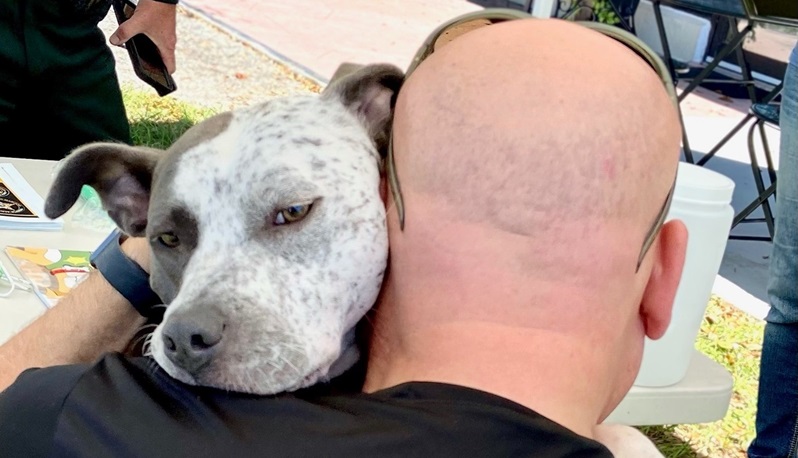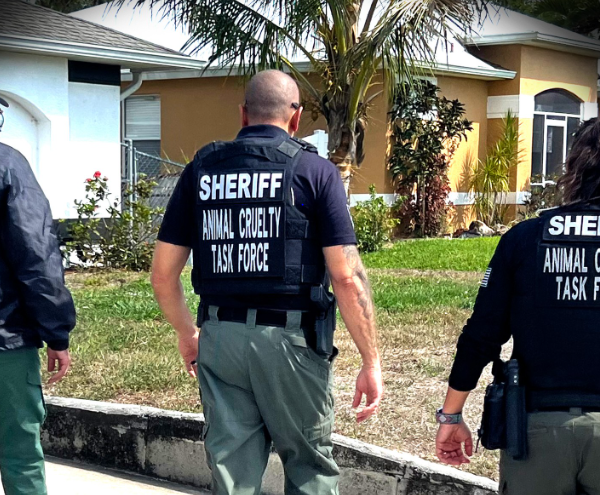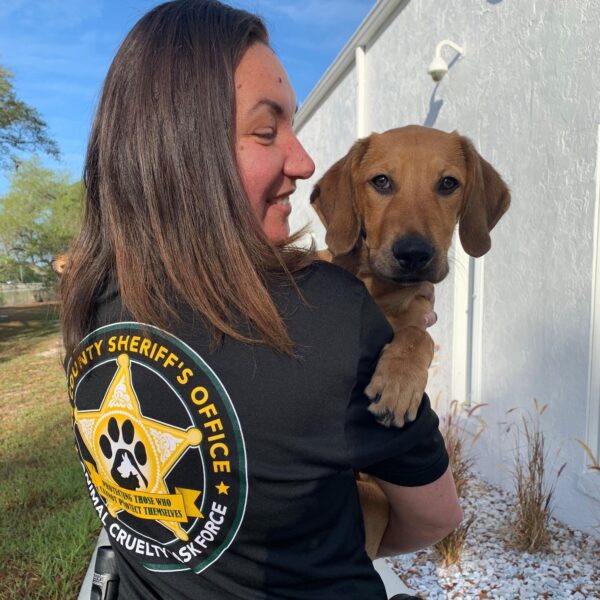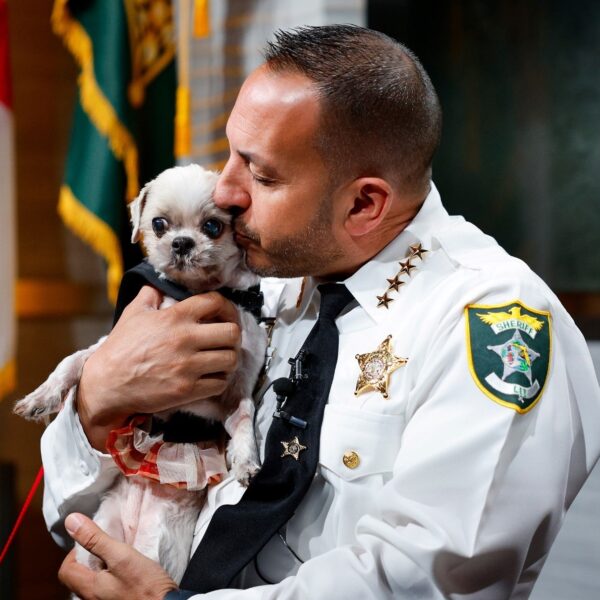
Although stray animals roaming free and cops responding to animal abuse calls are nothing new, the ubiquitous compassion of law enforcement officers is on full display when either a domestic pet or wild livestock needs salvation.
Mahatma Gandhi once said, “The greatness of a nation can be judged by the way its animals are treated.”
A study by the Chicago Police Department conducted during 2001-2004 found that “a startling propensity for offenders charged with crimes against animals to commit other violent offenses toward human victims,” as cited by the US Humane Society. One huge predictor of those who mistreat and neglect animals is the propensity for domestic violence.
Proactive policing will always have its value in America, despite detractors favoring reactionary methods (aka, the damage is already done). Thus, it is a major ingredient for our voiceless animal population to have strident justice heroes on the trail, diligently sniffing out potential batterers.
Although America’s sworn law enforcement personnel possess the authority, training, and wherewithal to investigate reports/indications of animal cruelty, it seems the heartrending horrors perpetrated against animals of all kinds is festering.
Before we advance today’s discussion, it is important to make a distinction between animal control officers (ordinarily employed by either the county or respective sheriff’s office) and animal cruelty task force cops. The former are typically civilians filling the role of a classical dog catcher, rounding up loose animals who need proper care, while the latter possess arrest powers and use them when investigating reports of animal abuse/neglect.

(Photo courtesy of the Lee County Sheriff’s Office.)
Many of the abuse/neglect reports are made by animal control officers to sworn police officials. Both are integral roles in safeguarding our furry friends.
I noticed more law enforcement agencies launching Animal Abuse contingents, with cops assigned to investigate situations involving outright violence against any creature and/or inhumane treatments such as neglect of care (ill-health) and sustenance (food/water deprivation).
On this note, instances of atrocities committed against animals weigh heavily on the hearts of cops, factoring into the exponential stressors our nation’s LEOs endure by their selfless nature and professional responsibility.
As we recognize May as Mental Health Awareness month, salvaging animals from destruction by the violent hands of a human cakes on considerable duress for investigators.

(Photo courtesy of the Lee County Sheriff’s Office.)
On May 10, 2024, an ordinance to establish an Animal Abuse Registry, enacted December 2023 by Lee County, Florida’s County Commission, is heralded by the sheriff, who harbors confidence the local legislation will boost salvation and preservation of animals by identifying heavy-handed, cold-hearted humans whose compassion for God’s creatures is absent.
“One of my most important initiatives is protecting those without a voice,” said Lee County Sheriff Carmine Marceno.
Similar to the Sexual Offender Registry whereby known violators are subject to certain restrictions (must refrain from living/visiting certain areas and are subject to mandatory unannounced visits by law enforcement officials to ensure compliance with Court orders), Florida’s Animal Abuse Registry stipulates convicted violators are publicly listed and comply with severances imposed by the Courts (contact with animals, etc., see Lee County ordinance).
Florida Voice News reporter Anita Padilla wrote how such a registry got its legs: “The Lee County Animal Abuse Registry was created with help from the sheriff’s Animal Cruelty Task Force and the legal teams of both the county and the sheriff’s office. County commissioners endorsed the idea with unanimous support for a county-wide ordinance.”
The Animal Abuse Registry has a two-fold doctrine, touted by Lee County Sheriff Carmine Marceno:
“This is a big, big deal. So now [animal abusers] have to register. And moving forward what I want to do is take it statewide because then we’ll a have a statewide registry that identifies these psychotic people that abuse animals and then, secondly, it keeps the animals away from them for five years.”
This means those in the business of breeding and/or marketing animals must scrutinize any would-be adopter, checking the Registry for red flags and record of violent behavior toward animals.
“The registry prohibits abusers from having any contact with animals. Animal shelters, pet sellers, and private citizens are not allowed to transfer ownership of animals to those on the registry list. Abusers are not allowed to own or live in the same home or property as an animal, nor will they be allowed to work with animals for a period of five years,” explained Ms. Padilla.

(Photo courtesy of the Lee County Sheriff’s Office.)
Florida’s Marion County government similarly enacted a county ordinance called Molly’s Law, creating an Animal Abuser Registry:
“Molly’s Law requires any offender convicted of an animal abuse crime as defined in Marion County Code, Chapter 4, Section 4-15, to be placed on the animal abuser registry. This database will allow citizens, pet sellers, and [animal] rescue [organizations] to verify that they are not placing an animal with an animal abuser.
As an animal lover, I follow the litany of hardships encountered by dog rescue operations and the usually-voluntary staff who provide tender love and care, sustaining itself on meager funds. A few of these animal rescue ops apply extremely stringent screening processes to thoroughly vet prospective animal adopters.
To their credit, animal rescue operators echo how many who apply as potential adopters are declined because they don’t meet muster, mostly due to the lack of surety necessary for the animal’s optimal well-being. (That’s a generic way of internalizing that Something is not quite right here!)
It is highly habitual for America’s cops to come across stray animals roaming the streets, especially at night when they are more likely to brave coming out of hiding to forage for scraps.

(Photo courtesy of the Lee County Sheriff’s Office.)
As I’ve written about before, my department set up a make-shift animal kennel area in an alcove of Police headquarters. There, found dogs and cats (and other non-domestic animals) were temporarily stored through the midnight shift, fed/watered by public safety dispatchers, until county-employed civilian animal control officers could retrieve them for intake at the government-owned-and-operated shelter.
At these shelters, any visitors seeking to adopt a pet generally apply and are vetted, the final score determined by respective animal abuse registry listings. Once approved, the animal control facility administrator’s due diligence avails new homes for these loving creatures that were dealt a bad hand and rescued by law enforcement authorities.
The adage of criminal propensity in the future is most evident in how a human treats (mistreats) an animal is Gandhi gold, akin to the Broken Windows Theory. Anyone who inflicts malice on an animal is likely going to escalate and be physically violent toward other humans, whether domestic (Chicago PD study mentioned above) or unfamiliar.
Sadly, animals find themselves in the middle of conflicts and become proverbial punching bags battered by anger-prone people who cowardly cause grief for innocent pets of all kinds.
“We’ve seen one [example] recently where domestic violence between a domestic couple, and unfortunately, our suspect shoots the dog Louie in the head, it comes out the snout. He suffers from that, and thank God Louie survives,” Sheriff Marceno said. The evil-tempered abuser was arrested.
Subsequent to Louie’s horrific victimization, LEOs turned the gore into glory, resulting in a wagging tail.

(Photo courtesy of the Lee County Sheriff’s Office.)
Louie was saved by Lee County deputies assigned to the Animal Cruelty Task Force and lives on to give that unambiguous brand of unconditional love and receive loving owners’ reciprocity, free from violence.
“Talk about a great dog. Louie is loving life. So relaxed, non-aggressive, and again gets adopted to a great home,” said Sheriff Marceno, illustrating the dividends developed by deputies rescuing animals from barbarians who batter.
“So, I was taking that animal, not just saving them from the abuse, but you know, working hard to protect them in the future from not being abused again.”
Proof-positive already unfolded, but deputies decided to clean the slate further…
“We’re happy to announce [Louie’s] been renamed Frankie and was adopted by TeamLCSO Detective Justin Gallant and Communications Supervisor Kristin Berzins! (Depicted in our cover photo.)
“Frankie is enjoying his new home with three other pups, eats turkey treats, and sleeps in bed with mom and dad.”
Cops and animals just seem to go well together. It is evident in the rescues…

(Photo courtesy of the Lee County Sheriff’s Office.)
It is evident how well cops partner with skillfully endowed police canines in service-oriented roles, producing success after success in myriad fashions.
It is evident in how law enforcement officers lavish retired police dogs with love and comfy digs, a family member until the bittersweet end.
“We will protect those that cannot protect themselves…children, the elderly, and animals,” Sheriff Marceno echoed on behalf of law enforcement.